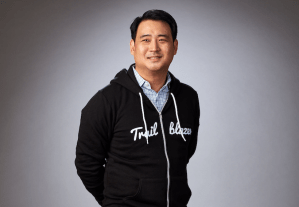Founded in 1905, Georgia-based Piedmont Healthcare is a $4 billion-dollar-a-year nonprofit healthcare company now serving more than 2.7 million patients across the state and has been recognized as an innovator in this transformation. The nonprofit health provider is a leader in cancer care, heart disease treatment, organ transplants and orthopedics, with more than 23,000 employees providing care at 800 locations including 11 hospitals, urgent-care and quick-care, and clinical practice locations.
We sat down with Trailblazer Andy Chang, Executive Director of Marketing and Physician Outreach for Piedmont Healthcare, to discuss how he’s using Health Cloud and other Salesforce products to gain a complete view of each patient to deliver personalized medicine at scale.
Can you tell me about some of the trailblazing work you do with Piedmont day in and day out?
Chang: My main role is driving volume and revenue into our system, using tools like Salesforce Health Cloud, Marketing Cloud and Pardot. We’re trying to look for new patients who have special needs when it comes to healthcare and we collect a lot of this data working with Salesforce tools and capabilities. We build relationships with patients themselves and also work with physicians who provide referrals for these patients to our hospitals.
How you are innovating with Salesforce Health Cloud and other Salesforce technology?
Chang: We are all in with Salesforce, one of our key enterprise systems for patient-facing engagement. One of the innovations we’re focused on, aside from basic tracking of employee activities, is creating better lines of communication and connectivity between our different internal teams spanning physician outreach, physician recruiting, physician onboarding and several other internal departments. We always want the left hand to know what the right hand is doing and want to make sure we’re creating tight relationships with our physicians, so that we’re always being transparent with each other and breaking down silos.
How has Salesforce Health Cloud specifically enabled Piedmont to deliver personalized medicine at scale?
Chang: Salesforce Health Cloud is able to deliver more than just personalized medicine at scale. Health Cloud also helps us with several other use cases including delivering personalized appointment reminders with our patients. This is all done through an automated process that involves access to Electronic Health Records.
We’re trying to automate even more than that with MuleSoft’s Anypoint Platform we’re able to unlock our data with reusable APIs which enables us to have real time data going back and forth between Salesforce and Epic Systems, including the actual scheduling of appointments, rescheduling appointments, medication refills and reminders, and more.
This is the first year we’re working with MuleSoft and we already have about two dozen projects we’re planning to launch. We’re trying to use data in a way that is both relevant and personalized to each patient and trying to convince them to take specific actions, whether that is through email, text or some other channel. We want to make sure our patients are receiving the most benefits, not only during their appointments, but also post-appointment.
What do you think are some of the major challenges facing Piedmont today? How is Salesforce helping you solve for these challenges?
Chang: It’s about attracting the right patient mix, so we can continue to fulfill our mission. There is a saying “no margin, no mission” and so patients who have commercial insurance are obviously very important to any healthcare organization like ours.
It has now become the job of marketers to make sure we track as much revenue as possible, while continuing to serve the community as a whole. We are trying to attract patients with commercial insurance to encourage them to choose Piedmont and want to serve the community as a whole in a way that is financially responsible.
Salesforce: What piece of advice do you have for other companies in the healthcare space who are considering adopting CRM?
Chang: I would recommend making these decisions as if you’re running your own business because when you’re running your own business, you always need to do what’s best for you and your customers. Part of this is making sure you have complete control of the tools you purchase.
You want to make sure you’re leveraging these tools to provide yourself with the flexibility to scale when needed. It also needs to be personalized to fit your needs and the needs of your patients. That’s why we chose Salesforce.
In the future, what do you think are some of the technology trends that will be most impactful for the healthcare space?
Chang: We’re using a lot of tools that are very innovative in the healthcare space. What we would like to do in the future that we aren’t doing yet is integrating the entire journey of a patient in one system, ranging from searching for the right doctor to settling bills.
Right now, we have different data sources that accomplish different things. In order to connect them all, we need a unique patient ID or a unified patient ID. We can in fact track the entire activity and make sure that the messages that we send and the engagement that we have with the patients is holistic in its approach.
We ultimately want to move to a more of a customer-focused data platform, which I know Salesforce is passionate about. And that will enable us to send customized and relevant messages to patients, encourage them to for instance, rebook their appointments.
Find out more about “How Piedmont Healthcare Personalizes the Patient Experience to Drive Loyalty.”



